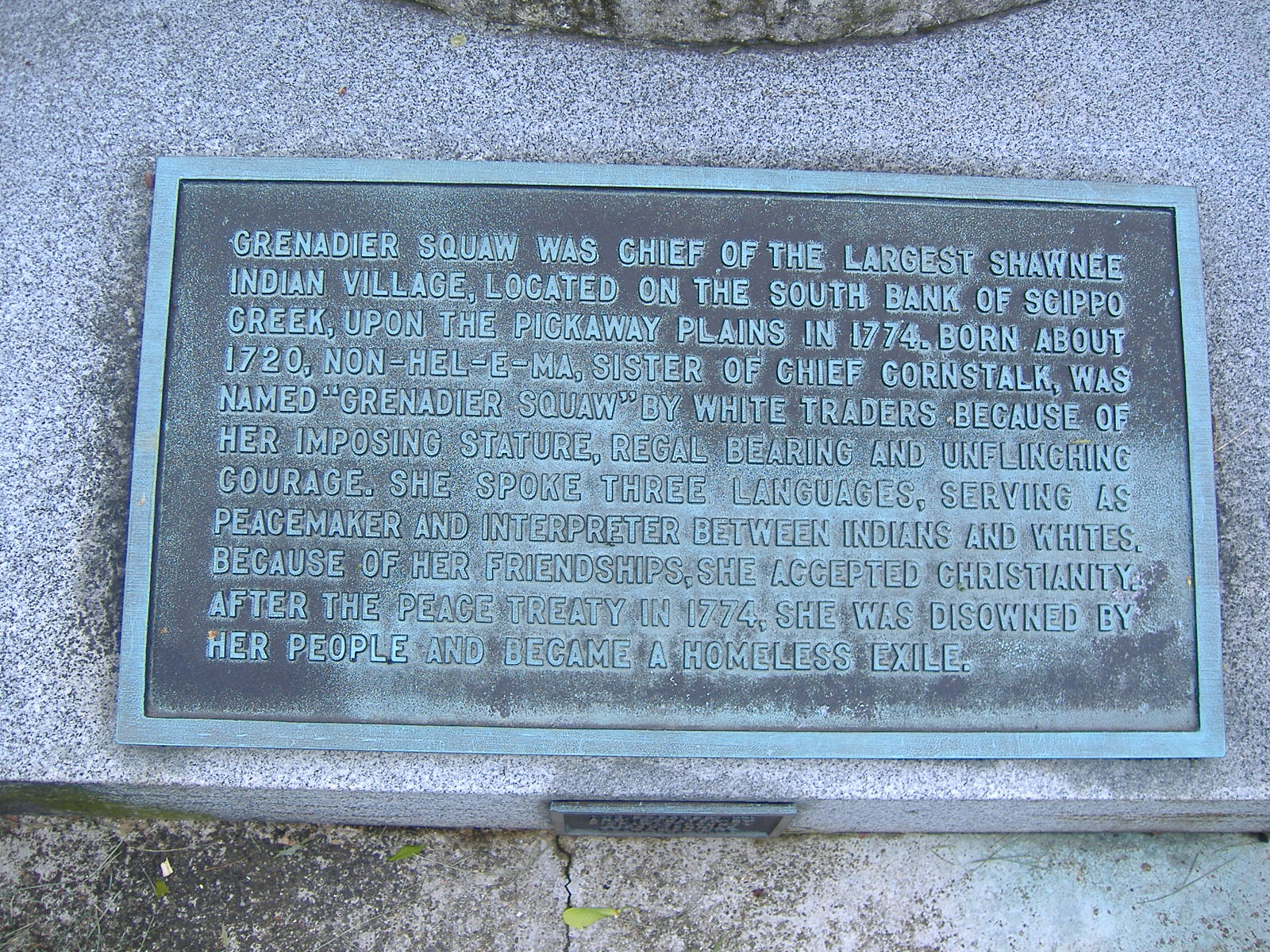Nonhelema on:
[Wikipedia]
[Google]
[Amazon]
 Nonhelema Hokolesqua (–1786) was an 18th century
Nonhelema Hokolesqua (–1786) was an 18th century
 Nonhelema Hokolesqua (–1786) was an 18th century
Nonhelema Hokolesqua (–1786) was an 18th century Shawnee
The Shawnee ( ) are a Native American people of the Northeastern Woodlands. Their language, Shawnee, is an Algonquian language.
Their precontact homeland was likely centered in southern Ohio. In the 17th century, they dispersed through Ohi ...
leader and sister of Cornstalk "Corn stalk" or "Cornstalk" may refer to:
* The stem of a maize plant
* ''Dracaena fragrans'' or cornstalk dracaena, a flowering plant
* Cornstalk (Shawnee leader), a Shawnee Indian chief during the American Revolution (1720–1777)
* Cornstalk, We ...
. She was a participant in Pontiac's War and advocated Shawnee neutrality during the American Revolutionary War
The American Revolutionary War (April 19, 1775 – September 3, 1783), also known as the Revolutionary War or American War of Independence, was the armed conflict that comprised the final eight years of the broader American Revolution, in which Am ...
. Following the war, and despite her support for the United States, Nonhelema's village was attacked. Her husband, Shawnee Chief Moluntha, was killed, and Nonhelema was captured. She died later that year.
Born in 1718 into the Chalakatha (Chilliothe) division of the Shawnee nation and spent her early youth in Pennsylvania. Her brother Cornstalk, and her Métis
The Métis ( , , , ) are a mixed-race Indigenous people whose historical homelands include Canada's three Prairie Provinces extending into parts of Ontario, British Columbia, the Northwest Territories and the northwest United States. They ha ...
mother Katee accompanied her father Okowellos to the Alabama country in 1725. Their family returned to Pennsylvania within five years. In 1734 she married her first husband, a Chalakatha chief. By 1750 Nonhelema was a Shawnee
The Shawnee ( ) are a Native American people of the Northeastern Woodlands. Their language, Shawnee, is an Algonquian language.
Their precontact homeland was likely centered in southern Ohio. In the 17th century, they dispersed through Ohi ...
chief, having significant influence within the Shawnee settlement in Kentucky
Kentucky (, ), officially the Commonwealth of Kentucky, is a landlocked U.S. state, state in the Southeastern United States, Southeastern region of the United States. It borders Illinois, Indiana, and Ohio to the north, West Virginia to the ...
known as Lower Shawneetown.
Nonhelema had three husbands. The first was a Shawnee man. The third was Shawnee Chief Moluntha. She had a son, Thomas McKee, through her relationship with Indian agent Colonel Alexander McKee and another son, Captain Butler/Tamanatha, through her relationship with Colonel Richard Butler.
Nonhelema, known as a warrior, stood nearly six feet, six inches (198 cm). Some called her "The Grenadier
A grenadier ( , ; derived from the word ''grenade'') was historically an assault-specialist soldier who threw hand grenades in siege operation battles. The distinct combat function of the grenadier was established in the mid-17th century, when ...
" or "The Grenadier Squaw", due to the large height of 18th-century grenadiers. She was present at the Battle of Bushy Run in 1763. Nonhelema and Cornstalk supported neutrality when their land became the Western theater of the American Revolutionary War. In Summer 1777, Nonhelema warned Americans that parts of the Shawnee nation had traveled to Fort Detroit
A fortification (also called a fort, fortress, fastness, or stronghold) is a military construction designed for the defense of territories in warfare, and is used to establish rule in a region during peacetime. The term is derived from Lati ...
to join the British.
Despite Cornstalk's 1777 murder at Fort Randolph, Nonhelema continued to support the United States, warning both Fort Randolph and Fort Donnally of impending attacks. She dressed Phillip Hamman and John Pryor as natives so they could go the 160 miles to Fort Donnally to give warning. In retribution, her herds of cattle were destroyed. Nonhelema led her followers to the Coshocton area, near Lenape
The Lenape (, , ; ), also called the Lenni Lenape and Delaware people, are an Indigenous peoples of the Northeastern Woodlands, Indigenous people of the Northeastern Woodlands, who live in the United States and Canada.
The Lenape's historica ...
Chief White Eyes. In 1780, Nonhelema served as a guide and translator for Augustin de La Balme
Augustin Mottin de La Balme (; 28 August 1733 – 5 November 1780) was a French soldier who served in Europe during the Seven Years' War and in the North America during the American Revolutionary War. His attempt to capture Fort Detroit in 1780 e ...
in his campaign to the Illinois country.
In 1785, Nonhelema petitioned Congress for a 1,000-acre grant in Ohio, as compensation for her services during the American Revolutionary War
The American Revolutionary War (April 19, 1775 – September 3, 1783), also known as the Revolutionary War or American War of Independence, was the armed conflict that comprised the final eight years of the broader American Revolution, in which Am ...
. Congress instead granted her a pension of daily rations, and an annual allotment of blankets and clothing.
Nonhelema and Moluntha were captured by General Benjamin Logan in 1786. Moluntha was killed by an American soldier, and Nonhelema was detained at Fort Pitt. While there, she helped compile a dictionary of Shawnee words. She was later released, but died in December 1786.
Fictional depictions
Nonhelema is the subject of ''Warrior Woman'', a 2003 novel authored by James Alexander Thom and Dark Rain Thom. She is portrayed by Karina Lombard in the November 2016 episode "Stranded" of the NBC TV series '' Timeless''.References
{{DEFAULTSORT:Nonhelema 18th-century women rulers Women Native American leaders Native American people in the American Revolution Native American people of the Indian Wars Native American women in warfare 18th-century Shawnee people Women in the American Revolution 1720s births 1786 deaths Year of birth uncertain 18th-century Native American women 18th-century American women 18th-century Native American people Native American people from Pennsylvania Shawnee leaders